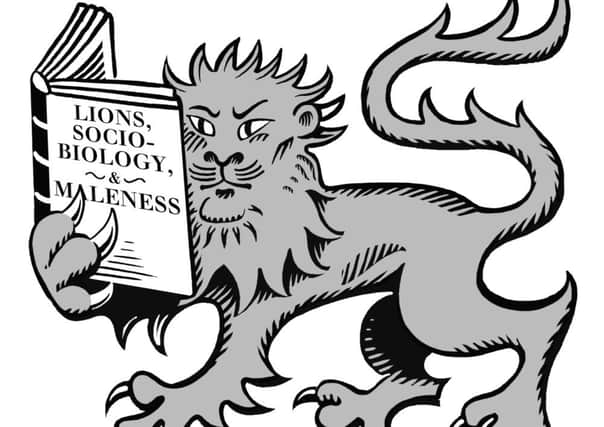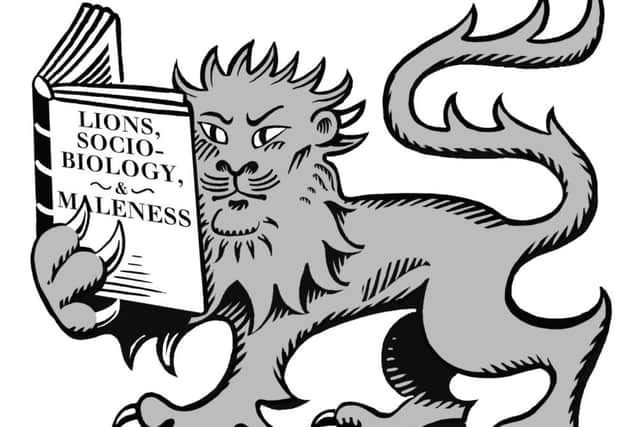44 Scotland Street: Lions, sociobiology, and maleness


It was not that she was in any way awkward in her dealings with people – none of her many friends would have described her as being difficult to get on with – the difference between her and Angus was more subtle than that, residing somewhere in the tricky territory of male-female distinctions. The trickiness lay in the fact that in a society with an official commitment to removing salience, such matters as the differences between men and women were rarely talked about openly.
Both Domenica and Angus were in their late forties. Both were old enough, then, to have witnessed the dismantling of patriarchal society. Both had welcomed this change – Angus because he had never seen the justification for male assumptions of entitlement, and in Domenica’s case because, like any woman of her age, she had encountered male condescension or, as she put it, male pushiness and had resented it. She had never struck an overtly feminist pose, but had understood why there were those who felt they had to do just that. The walls of bastions had to be pulled down if a new, just architecture were to be established – she knew that had to happen – but she had never liked the anger with which that process was sometimes tainted. In claiming a right, Domenica felt, you did not necessarily have to humiliate whole swathes of humanity. So she had never felt comfortable with the distaste that some of the more aggressive warriors in the struggle for women’s rights expressed for men in general.
Advertisement
Hide Ad“Men may be misguided and, indeed, at times arrogant,” she said to a friend. “But try as I might, I can’t dislike them with quite the intensity that some feminists manage.”


The friend had smiled. “Nor I. In fact, I rather like men. I know that’s a very unfashionable view, but there we are. I suppose the issue is maleness, isn’t it?”
“Well, yes, but …”
The friend had expanded on the theme. “Maleness exists as a phenomenon in nature, doesn’t it? You can observe it in … well, I suppose, in any animals you care to examine. Lions. Cats. Elephants. Everything, come to think of it. The male is usually larger, stronger, and more assertive.”
Domenica looked thoughtful. “Perhaps.”
“No, not perhaps. Definitely. Male creatures tend to dominate. Look at lions. You have your head lion, or whatever he’s called …”
“Leader of the pride, I suppose.”
“Yes, him. And he’s the one who calls the shots. He’s the boss.”
Domenica shook her head. “I’m not sure that these socio-biological arguments are going to get us very far. Human society is far more complex than that. Yes we have biology in the background, but social organization is something that isn’t determined solely by biological impulses.”
Advertisement
Hide AdHer friend sighed, as if faced with some nit-picking scholastic objection. “But these impulses drive it. They do! Men are the ones who do the hunting and fighting. Women do the nurturing.”
Domenica was cautious. “Possibly. Possibly. But lionesses, you know, make the kill much of the time. Then the male comes along and eats what she’s caught.”
Advertisement
Hide AdShe paused. “I don’t know where this is taking us. The trouble with sociobiological arguments is that they end up justifying a very bleak vision of what humanity can be or do. They’re a dead end because they see human society as being red in tooth and claw and that’s it.”
“But perhaps we are. Perhaps life – all life – is just a matter of competition for control of space and resources. Ultimately, most arguments are about who gets what.” She looked at Domenica with the expression of one who had uncovered some fundamental truth. “That’s what wars are, don’t you think? One group wants something – land, water, food, whatever – and another group wants it too. Result? Conflict.”
“Yes, but … “ Domenica was struggling. The grim, reductionist logic of her friend’s position did not appeal to her, and yet was difficult to refute. Yet there was an answer, and that, she felt, lay in reason. Reason was the straw at which we might grasp. But her friend had lost interest, and was returning to the subject that had launched their debate: maleness.
“Maleness exists, don’t you think?”
Domenica nodded. “Yes. Yes, it does.”
“But what exactly is it?”
Domenica thought it was an approach to the world. “It’s an attitude. It’s an attitude of engagement.”
“Engagement?”
Domenica was pleased with the term, and warmed to the subject. “Yes. Look at the way in which a little boy plays. He prods. He investigates things and about him. He moves them. He tries to push them over. Then look at girls. They touch things gently. They watch them. They don’t try to push them about. They …” She searched for the right word. “They cherish them.”
The friend agreed. “Yes,” she said. “It’s exactly that.”
“So,” continued Domenica. “If we’re agreed that maleness is something to do with engagement, then why do we find it attractive … assuming, of course, that we do find it attractive.”
Advertisement
Hide AdThe friend smiled. “Yes, we do. As women, we do. We like it. We like men, or at least, those of us who like men like it.”
Domenica raised an objection. “And we don’t like men who don’t have that maleness about them?”
Advertisement
Hide AdThis was problematic. “No, we do like them. Women like sensitive men – men who aren’t interested in pushing or shoving things about.”
Domenica thought of the sensitive men she knew. She had several friends in that category. “But we don’t like them for their maleness, do we?”
“No, we like them because they’re easy company. Because we can talk to them. It has nothing to do with maleness.”
They looked at one another, and smiled. Their discussion had come back to that central mystery of the way in which men and women saw one another and why, because of that, the ancient dance of fascination took place.
“So, why do we do it?” asked Domenica.
“Get involved with men? Fall for maleness?”
“Yes.”
The friend hesitated. “Because we want to possess it,” she said. “Because we want to possess men, to tame them, to own them.” She paused. “Remember D.H. Lawrence’s essay, Flowery Tuscany?”
“Of course,” said Domenica, perhaps a little bit too quickly.
Advertisement
Hide Ad“Because he points out,” the friend continued, “that when women see flowers they feel the need to pick them – to possess them – whereas men don’t.”
Domenica said nothing. She could not abide Lawrence. And anyway, if men didn’t pick flowers it was probably because they didn’t see them in the first place.